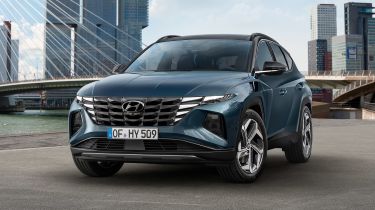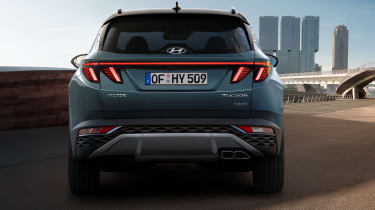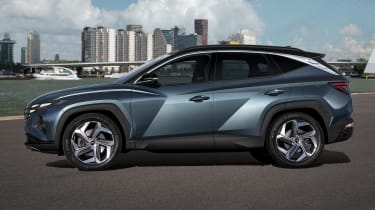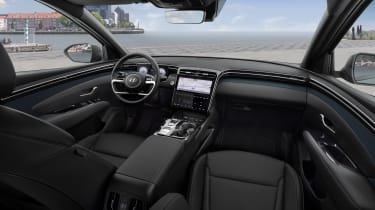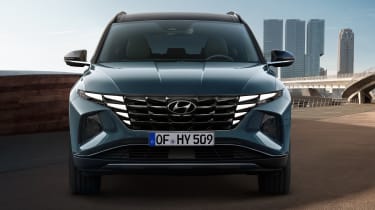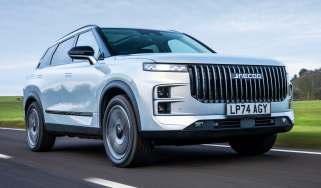New Hyundai Tucson SUV: plug-in hybrid starts from £39,330
The all-new Hyundai Tucson has radical styling and three hybrid options
- Plug-in hybrid features 261bhp and four-wheel drive
- Bold dashboard design with two screens
- Online features accessed through BlueLink app
The new Hyundai Tucson SUV is now available with a plug-in hybrid powertrain. The PHEV joins existing hybrid and mild-hybrid models, meaning Hyundai’s family SUV offers more electrification options than most rivals. The Tucson plug-in hybrid is available in two trim levels for a starting price of £39,330.
Like the hybrid version, you can choose from Premium and Ultimate trim levels. Premium features two 10.25-inch screens, sat nav and LED lights, while Ultimate adds bigger wheels, a panoramic sunroof, a powered tailgate and leather upholstery - it costs £42,030. Top-spec buyers can also add a Tech Pack (including self-parking ability and blind-spot monitoring) for £1,500.
A Hyundai Tucson N Line model was recently launched, with sporty looks and exclusive interior trim. This model will join the range in the next few months and will also be available with the plug-in hybrid option.
Hyundai Tucson plug-in hybrid
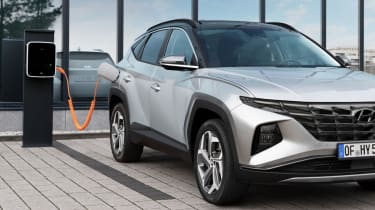
Joining the 1.6-litre ‘Smartstream’ petrol engine for the PHEV model is a powerful electric motor and a 13.8kWh battery. The two power sources produce a maximum of 261bhp when combined, and the battery is big enough to provide an electric range of ‘over’ 31 miles; an official figure will be released once the car has been tested on the WLTP emissions test cycle. Four-wheel drive is standard, along with dedicated terrain modes and a six-speed automatic gearbox.
You can recharge the battery using a public charger or a home wallbox, and the Tucson plug-in hybrid can take up to 7.2kW so the battery should be fully topped up from a home charger in several hours. The positioning of the battery means there’s slightly less boot space than in some versions but it’s noticeably bigger than the previous car’s boot and still huge at 558 litres.
The initial concept version of the new Tucson was a plug-in hybrid model, so it was all but guaranteed that a production version would follow suit. The Tucson plug-in hybrid will rival the Peugeot 3008 Hybrid4, the Vauxhall Grandland X Hybrid4 and the Mitsubishi Outlander PHEV. As expected, the Tucson plug-in hybrid is one of the more expensive versions in the lineup; the cheapest Tucson is £28,495.
Hybrids and engines
You can also choose a regular hybrid version with a smaller battery, which comes with either two- or four-wheel drive. The hybrid system uses the 1.6-litre petrol engine and produces 227bhp. The same petrol engine is available in 148bhp and 178bhp mild-hybrid versions, and as a 148bhp model without any hybridisation at all.
Styling
Rivals will continue to include the Skoda Karoq, Peugeot 3008 and Kia Sportage but the new 2020 Hyundai Tucson makes its competitors’ styling look rather dull in comparison. The front end is dominated by what looks like a huge grille, with headlights on each flank. They blend in with the grille when the car is turned off.
It’s not just the front end where the designers have made changes; the sides feature incredibly sharp lines, most noticeably around the exaggerated wheel arches and away from the lights. A silver trim strip will be adopted above the windows to make it look sleek. Meanwhile, a full-width light bar connects similarly angular rear lights, and the rear wiper is hidden under the spoiler. Three of the nine paint colours are new and you can pick a contrasting roof in either black or grey.
Dimensions
The new Tucson is 20mm longer and 15mm wider than before, plus the distance between the front and rear wheels is greater. Passenger and boot space have been improved as a result - there’s 26mm more rear legroom, while the boot measures between 546 and 620 litres depending on the engine you choose.
Interior and technology
Stepping inside, you’re treated to a fully reworked interior with intricate surfaces and increased technology. A 10.25-inch digital instrument cluster, without a cowl, is fitted behind a new steering wheel, and there’s an integrated touchscreen prominently displayed in a centre console that protrudes from the dashboard. Just like the Hyundai Santa Fe, the dashboard design flows into the door cards, while overall the interior styling isn’t dissimilar to a luxurious Audi A6.
Climate control is a big part of the Tucson’s repertoire, with three-zone air conditioning, the ability to have ventilated heated front seats (and heated rear seats) plus a new Multi-Air Mode for the air con. This is said to use the air vents directly and indirectly, giving the same amount of cool air as a standard system but more gently.
Technology includes Apple CarPlay and Android Auto, while connectivity can be enhanced by downloading Hyundai’s BlueLink phone app. This lets you have more accurate online navigation data, shows you where you’ve parked, lock/unlock the car remotely and switch settings depending on the selected user profile.
There’s also a new Rear Sleeping Mode, which turns down the speaker volume in the rear seats. Hyundai has paired this with a Rear Occupant Alert, which reminds you not to leave passengers in the car.
Safety
As well as the usual auto emergency braking and lane-departure warning, the new Tucson offers a couple of extra features rarely seen before. The Forward Collision Warning feature includes Junction Turning, which monitors cars coming across the front of the car.
Lane-following assist keeps you in the centre of the lane, while adaptive cruise control keeps a safe distance from the car in front. Together, that gives the Tucson a degree of self-driving ability, and you can also have smart cruise control that can brake for upcoming corners based on GPS data. There’s also a Blind View Monitor, which shows a camera feed of your blind spot in the instrument cluster when you indicate.
Read our review of the current car for more information, or read our guide to the best hybrid SUVs currently on sale.
Recommended

New Subaru Trailseeker revealed as rugged electric SUV with 375bhp

New Subaru Solterra brings more range, power and polish
Most Popular

Omoda E5 targets rivals: now with zero deposit and APR

Ford Puma Gen-E driven: Electric charmer or too little, too late?
Tips & advice

Car dashboard warning lights: what does each symbol mean?

Electric car charging stations: public networks, charger types, apps and maps


